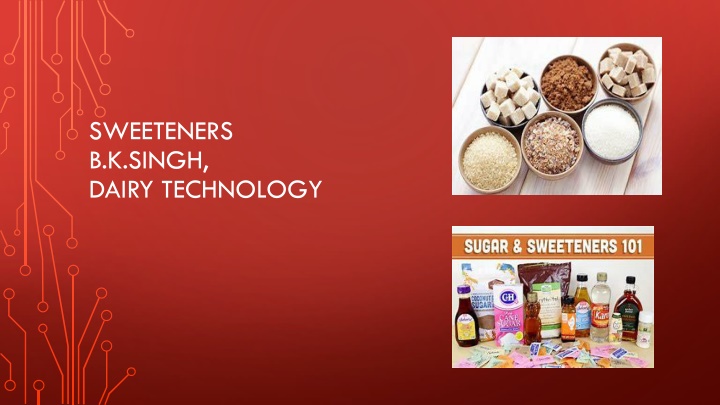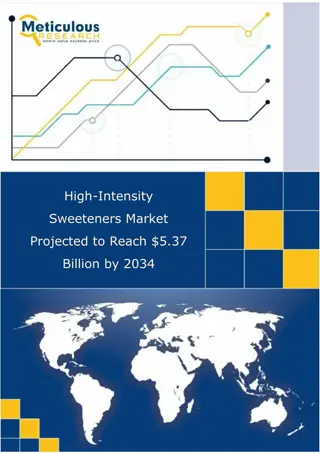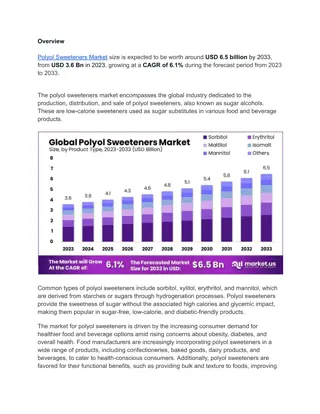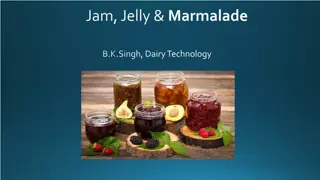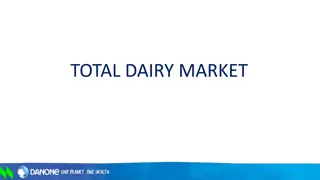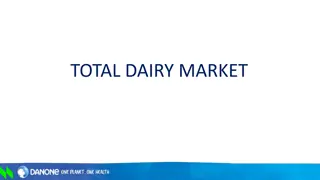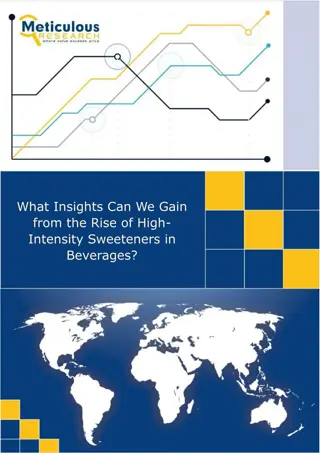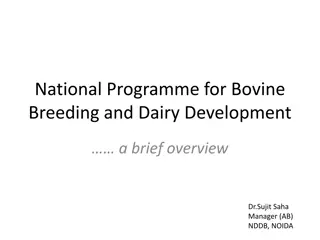Artificial Sweeteners: Types, Risks, and Benefits in Dairy Technology
Artificial sweeteners, including aspartame and acesulfame potassium, are widely used as sugar alternatives in various food products. While they offer sweetness without the calories, some artificial sweeteners have been linked to potential health risks. Understanding the different types of sweeteners and their impact is crucial for making informed dietary choices, especially in the field of dairy technology.
Download Presentation

Please find below an Image/Link to download the presentation.
The content on the website is provided AS IS for your information and personal use only. It may not be sold, licensed, or shared on other websites without obtaining consent from the author.If you encounter any issues during the download, it is possible that the publisher has removed the file from their server.
You are allowed to download the files provided on this website for personal or commercial use, subject to the condition that they are used lawfully. All files are the property of their respective owners.
The content on the website is provided AS IS for your information and personal use only. It may not be sold, licensed, or shared on other websites without obtaining consent from the author.
E N D
Presentation Transcript
SWEETENERS B.K.SINGH, DAIRY TECHNOLOGY
SWEETENERS Sweeteners provide an intense sweet flavour. They have become increasing popular as people look for different ways to satisfy their sweet tooth, without the associated energy (kilojoules or calories) of regular sugar. Sweeteners can be divided in to three categories: Artificial sweeteners Natural intense sweeteners Nutritive sweeteners
ARTIFICIAL SWEETENERS Artificial or non-nutritive sweeteners are often used as an alternative to sugar. These sweeteners are energy (kilojoule or calorie) free. Artificial sweeteners are found in a wide range of food and drink products in the supermarket. Many are tabletop sweeteners which can be used to add sweetness to tea, coffee, cereal and fruit in place of sugar. There are also a number of other products such as cordials, soft drinks, jellies, yoghurt, ice-cream, chewing gum, lollies, desserts and cakes which use these sweeteners. These products are often labelled as diet , low joule or no sugar .
Here are some of the most popular (and dangerous) artificial sweeteners on the market today. They can severely harm your health. First, it s important to be able to recognize artificial sweeteners on the labels of pre-packed and processed foods. Aspartame Acesulfame potassium Alitame Cyclamate Dulcin Equal Glucin Kaltame Mogrosides Neotame NutraSweet Nutrinova Phenlalanine Saccharin Splenda Sorbitol Sucralose Twinsweet Sweet N Low
ARTIFICIAL SWEETENERS Acesulfame potassium: Calories: 0 Found in: Soft drinks, gelatins, chewing gum, frozen desserts.This nonnutritive artificial sweetener was first approved by the Food and Drug Administration (FDA) in 1988, meaning it now has a 22-year track record in which no problems have surfaced. Agave nectar: Found in: Cereals, yogurts, tea.The nectar is a product of the agave cactus, and its taste and texture are similar to honey.It doesn t contain as many antioxidants as honey, but it contains approximately the same amount of calories. Agave, however, is sweeter than sugar, so proponents suggest you can use less to get similar sweetness. It contains more fructose than table sugar, which, according to a recent study, means it is less likely to cause a spike in blood sugar but could be more likely to reduce your metabolism and insulin sensitivity.
ARTIFICIAL SWEETENERS Aspartame:Calories: 0 Found in: Drinks, gum, yogurt, cough drops one of the most studied artificial sweeteners, aspartame has been accused of causing everything from weight gain to cancer.However, since being approved by the FDA in 1981, studies have found no convincing evidence and the FDA, the World Health Organization, and the American Dietetic Association say aspartame in moderation poses no threats.
ARTIFICIAL SWEETENERS Neotame:Found in: Some drinks, dairy products, frozen desserts, puddings, fruit juices. The newest on the market, this artificial sweetener was approved by the FDA in 2002.It is between 7,000 and 13,000 times sweeter than table sugar depending on what it is added to, and is produced by the same company that makes aspartame. Saccharin:Calories: 0 Found in: Drinks, canned goods, candy
NATURAL SWEETENERS Stevia:Calories: Found in: Diet drinks, yogurts, individual packets.Derived from the stevia plant, stevia leaf extract, also called rebiana, is deemed the natural alternative to artificial sweeteners.Although crude stevia extracts are not approved by the FDA, refined stevia products such as Truvia gained a Generally Regarded As Safe (GRAS) approval from the FDA in 2008.Stevia is a very popular low-calorie sweetener.It s extracted from the leaves of a plant called Stevia rebaudiana.This plant has been grown for sweetness and medicinal purposes for centuries in South America.Several sweet compounds are found in stevia leaves. The main ones are stevioside and rebaudioside A. Both are hundreds of times sweeter than sugar, gram for gram.Therefore, stevia is very sweet but has virtually no calories. Erythritol:s another low-calorie sweetener. It s a sugar alcohol found naturally in certain fruits. However, powdered erythritol available for purchase is most likely made via an industrial process.It contains 0.24 calories per gram, or about 6% of the calories in an equal amount of sugar, with 70% of the sweetness. 0
NATURAL SWEETENERS Xylitol: Xylitol is a naturally occurring alcohol found in most plant material, including many fruits and vegetables. It is extracted from birch wood to make medicine.It is a sugar alcohol with a sweetness similar to sugar.It contains 2.4 calories per gram, or about two-thirds of the caloric value of sugar.Xylitol appears to have some benefits for dental health, reducing the risk of cavities and dental decay Yacon Syrup: is another unique sweetener. It s harvested from the yacon plant, which grows natively in the Andes in South America.This sweetener has recently become popular as a weight loss supplement. One study found that it caused significant weight loss in overweight women.It s very high in fructooligosaccharides, which function as soluble fibers that feed the good bacteria in the intestine
NATURAL SWEETENERS High-fructose corn syrup:Found: Sodas, desserts, cereals. This hotly debated sweetener contains the sugars fructose and glucose from processed corn syrup.Because it's cheaper than sucrose and gives products a longer shelf life, more packaged foods in the U.S. especially soda, cereal, and yogurt contain HFCS as added sugar instead of sucrose. Honey:Found in: Cereals, baked goods, teas. Honey contains trace amounts of vitamins and minerals, and studies suggest it may not raise blood sugar as fast as other sweet products. oney, however, does contain calories and should be used as sparingly as any other full-calorie sweetener. Sucrose:Calories: 16 per teaspoon Found: Naturally in fruit; added to baked goods, jams, marinades, salad dressingsSucrose offers energy but no nutritional benefits. In 2003, a team of international experts recommended that added sugars make up no more than 10% of your diet, or about 12 teaspoons (50 grams) for a 2,000-calorie diet.
NUTRITIVE SWEETENERS Nutritive sweeteners, also known as caloric sweeteners or sugars, provide energy in the form of carbohydrates.Some sugars are found naturally in foods. For example, fructose is found in fresh fruits. By eating the whole fruit, you not only consume fructose, but you feed your body fiber, vitamins, minerals, and phytonutrients that you do not get from sugar alone.
NONNUTRITIVE SWEETENERS Nonnutritive sweeteners are zero- or low-calorie alternatives to nutritive sweeteners, such as table sugar. These sweeteners can be added to both hot and cold beverages and some can be used for baking. Nonnutritive sweeteners are much sweeter than sugar so only small amounts are needed. They provide fewer calories per gram than sugar because they are not completely absorbed by your digestive system. The Food and Drug Administration (FDA) has approved the use of the following nonnutritive sweeteners: acesulfame-K, aspartame, neotame, saccharin, sucralose and stevia.
